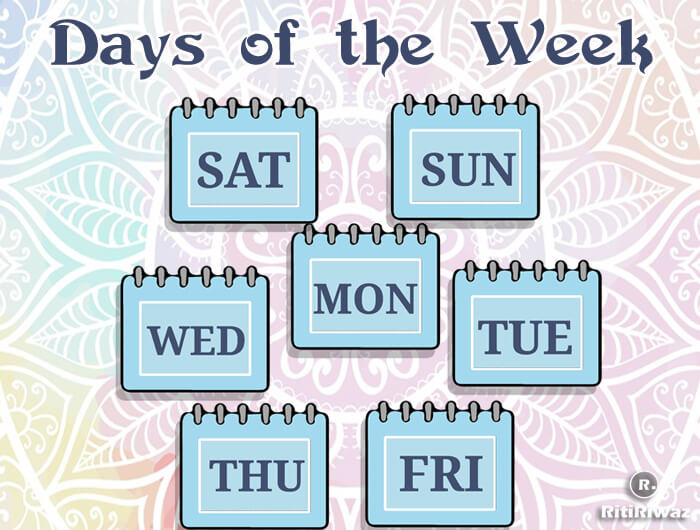Weekday Names

There are seven days in a calendar week. While each day has a distinctive spelling and sound, they all have one thing in common. They all end with the word DAY. So all you really need to remember is the first part of the word. They are named after celestial bodies and mythological figures from history.
English draws upon Ancient Greek, Latin, and Germanic languages and these influences can all be seen in the names of the days of the week. We use them every day without realizing just how much they tell us about our language and history, and they serve to show us the similarities between English and so many other European languages.
Greek and Roman gods
As Christianity became the official religion of the Roman Empire, the clergy became reluctant to use the names of the pagan gods, particularly in the Greek-speaking East.
The original order of the days, between the 1st and 3rd centuries, was Sun, Moon, Ares, Hermes, Zeus, Aphrodite, and Cronos. These were named after the heavenly bodies that presided over the first daylight hour of each day, according to Hellenistic astrology. From Greece, the planetary week names passed to the Romans, from Latin to other languages of southern and western Europe, and to other languages later influenced by them.
Why did the Romans name the days of the week after their gods’ names for the planets? Because they saw a connection between their gods and the changing face of the nighttime sky. The ones they were able to see in the sky each night were Mercury, Venus, Mars, Jupiter, and Saturn. Those five planets plus the moon and sun made seven major astronomical bodies so it was natural to use these seven names when the seven-day week arrived.
Suggested Read: Each Day of a Week is dedicated to Hindu God
Weekdays
Sunday
The first day of the week was named after the sun – dies Solis – day of the sun in Latin and later Sunnon-dagaz in old Germanic. It’s easy to see where the English word Sunday comes from here.
Monday
It’s similarly easy to see where this weekday name originates too. Monday is the moon day – dies Lunae in Latin, becoming Mon(an)dæg in Old English.
Tuesday
Whereas most English days of the week retain their associations with the Roman gods, some were substituted for the names of the equivalent Germanic gods, because English is a Germanic language.
Tuesday was named for the Roman god of war, Mars, so in Latin was known as dies Martis. However, the Germanic god of war was known as Tiu and the English day of the week is derived from this Germanic god’s name instead, first known as Tiwsday and eventually Tuesday.
Wednesday
Similarly, the Germanic equivalent of the Roman god Mercury was equally as swift Woden. And so this day, which started out in Latin as dies Mercurii became Woden’s day in old Germanic, eventually becoming Wednesday in English.
Thursday
Jupiter, also known as Jove, is the supreme Roman god and patron of the Roman state. He is the god that created thunder and lightning. Thor is the Norse god of thunder, often shown riding through the sky in a chariot. And it’s from this Norse god that we see the Latin dies Jovis (day of Jupiter) become Thor’s day and eventually Thursday.
Friday
Venus is the Roman goddess of love and beauty, and in Latin, her day was known as dies Veneris. We get the English name for Venus’ day from Frigg, the Norse goddess of love and the heavens, and possibly Fria, the Teutonic goddess of love and beauty. In Germanic we have Frije-dagaz, later becoming Friday in English.
Saturday
We end with an easy one. Saturn is the Roman god of agriculture, known in Ancient Greece as Cronos. In Latin, we have dies Saturni and it’s not hard to see that Saturday today is still very much Saturn’s day.






